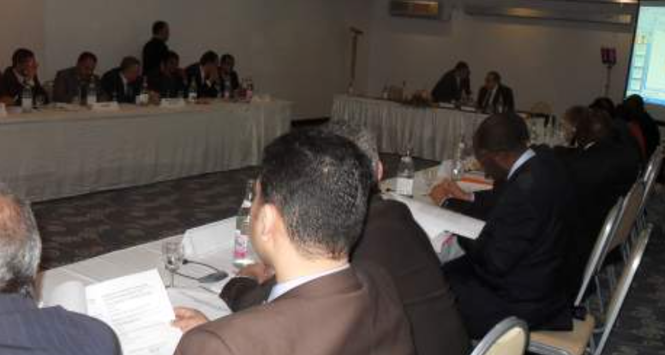
On April 24-26, the African Union organized a “Consultative Meeting with the Northern Region Countries on the Implementation of the Outcomes of the AU Special Summit of Refugees, Returnees and Internally Displaced Persons in Africa” in Tunis. The meeting gathered 35 participants, including legislators and government representatives from Northern African states, the African Maghreb Union as well as a number of partner organizations. A major goal the meeting was to discuss the signature, ratification and implementation of the African Union Convention for the Protection and Assistance of Internally Displaced Persons in Africa (Kampala Convention), adopted in 2009.
There have been 34 signatures to the Kampala Convention and 11 ratifications deposited thus far. Fifteen ratifications are required for the instrument to enter into force. In Northern Africa, only the Sahwari Arab Democratic Republic has signed it and none have ratified. However, several participants in the Tunis meeting indicated that their governments intended to do so. It was noted, however, that with new governments having recently emerged in several countries with very distinct objectives, a great deal of new legislation in many areas is currently under consideration.
It was pointed out that the Kampala Convention is the first region-wide treaty on the issue of internally displaced persons (IDPs) and has taken a very broad approach to the protection and assistance of IDPs, including persons displaced by conflicts, human rights violations, natural disasters and development projects. Signatory governments also take on significant commitments with regard to humanitarian assistance to IDPs. It was noted that the recent experience of displacements due to “Arab Spring” uprisings highlighted the importance of these commitments in the Northern Africa region.
As affirmed by Julia Joiner, Political Affairs Commissioner at the African Union, “it is clearly stipulated in the Convention that responsibility for the prevention and reduction of internal displacement, as well as the protection, assistance and durable solutions for displaced persons rests in the first instance with states. The heads of state have noted the potential financial limitations that might arise in implementing this responsibility. But the lack of resources should not become a pretext for the failure of states to fulfil their responsibility.”
The Kampala Convention provides for specific measures that states should take to facilitate humanitarian assistance to IDPs and declares that humanitarian organizations providing such aid must abide by humanitarian principles, international standards and codes of conduct. In this connection, the IFRC was invited to speak about how use of the IDRL Guidelines may assist Kampala Convention signatories to carry out their obligations. “The Kampala Convention sets out the broad directions that states should be ready to follow in order to facilitate and regulate humanitarian assistance,” observed David Fisher, IFRC Disaster Law Programme Coordinator, “the IDRL Guidelines can help with the details.”
The African Union informed participants that it is developing model legislation to assist states to implement the Kampala Convention, through the Africa Commission on International Law. In addition, a number of complementary policy documents, including a regional Humanitarian Policy Framework and Disaster Management Policy, are being developed.